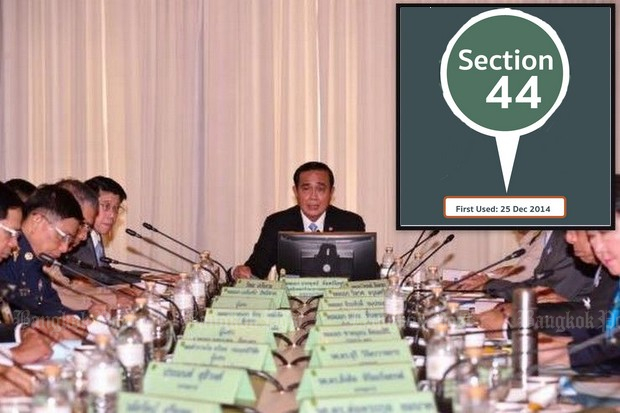
The National Council for Peace and Order (NCPO) will allow digital TV operators to transfer their licences to other private companies as part of measures to rescue those that are strapped for cash.
This opens the door for other private companies who are interested in the business and could help bail out existing operators in financial dire straits, said government spokesman Sansern Kaewkamnerd after a meeting of the NCPO chaired by Prime Minister Prayut Chan-o-cha Tuesday.
Currently, the NBTC bars digital TV operators from transferring their licences.
He said the operators acknowledged they could not afford to return the licences because they have already made large investments.
Lt Gen Sansern said the meeting also finalised other measures to ease their financial burden.
The NCPO will invoke Section 44 over the course of the next few days to implement the measures it approved Tuesday, which will see digital TV operators' licensing fee payments suspended for three years from 2018-2020.
This would give them sufficient breathing space to reinvigorate themselves and increase their liquidity in order to develop their businesses.
However, during the three-year debt suspension period they will be required to pay the Bank of Thailand's policy interest rate of 1.5%, Lt Gen Sansern said.
He said digital TV operators paid over 33 billion baht in licensing fees in May 2017.
They were required to pay the remaining 17 billion baht from 2018-2022 with the payment of the next instalment due on May 1.
Over the three years, audiences are expected to install more digital set-top boxes, which would give a boost to viewer numbers and advertising fees, observers have noted. This in turn would increase their income.
The National Broadcasting and Telecommunications Commission (NBTC) will also subsidise half of the rental fee for broadcasting networks for 24 months, Lt Gen Sansern said.
The operators who rent the broadcasting networks and which have already switched over from analogue to digital are MCOT Plc, Channel 5 and ThaiPBS.
Lt Gen Sansern said the measures were agreed by the NBTC, the Budget Bureau, the Finance Ministry, the State Audit Office, and the Thailand Development Research Institute, among others.
Thirteen digital TV operators had submitted a petition asking the NCPO for assistance, he said.
He said when the bids were put forward in 2013 the government only expected to see licence payments totalling 15 billion baht but very fierce competition then drove the amount of up to 50 billion baht.
The advent of so-called disruptive technology meant the NBTC could not meet the requirement to increase the viewership of digital TV operators which led to them suffering financial problems, Lt Gen Sansern said.
The NCPO agreed that the measures are appropriate because they support the operators without undermining the national interest.
Lt Gen Sansern said Deputy Prime Minister Wissanu Krea-ngam and relevant agencies were asked to work out further details and put the case for the use of Section 44 in writing and forward it to the prime minister for consideration.
Regarding the assistance for telecom operators, Lt Gen Sansern said no conclusion had yet been reached.
Meanwhile, Gen Prayut said the assistance for digital TV and telecom operators must be separated.
"The government is not favouring anyone. We have stepped in to help. We have sympathy for the business operators. When problems occur, the government must find the appropriate measures," Gen Prayut said.
The NBTC called bids for 49 digital TV channels in late 2013. Bidders offered 50.9 billion baht for 24 channels -- 3.3 billion baht on average for an HD channel and 650 million baht to 2.2 billion baht for standard resolution channels, depending on content type.
A year after the auction, several operators reported they had suffered huge losses, mainly due to the high licence fees and a sea change in the TV landscape -- driven by the proliferation of social media and streaming services.
Some, including Thai TV, blamed it on the NBTC, which they said had failed to expand viewership and multiplex stations nationwide as planned.
Only a handful of the operators had managed to post profits.
- See also: Section 44 decree keeps NBTC board in place
- Related: NBTC sets 1800-MhZ auction for Aug 4
- Earlier report: Prayut uses S44 to keep old NBTC board
- NCPO action planned: Three measures to help digital TV firms
